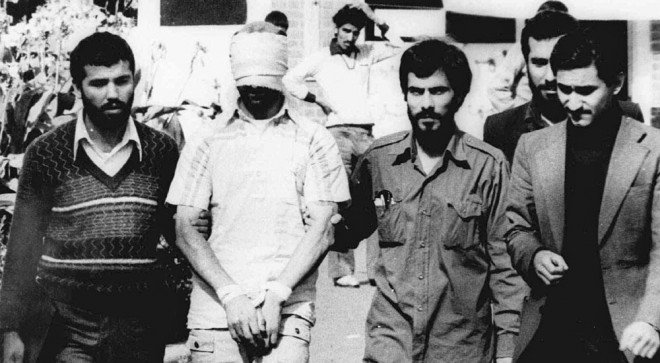Former US hostages react to Iran’s nuclear deal

In this Nov. 9, 1979, file photo, one of the hostages being held at the U.S. Embassy in Tehran is displayed to the crowd, blindfolded and with his hands bound, outside the embassy. Fifty-two of the hostages endured 444 days of captivity. Former Iranian hostages had varied reactions to the news of the nuclear deal between the U.S. and Iran in what is being billed as a trust-building agreement designed to yield a more comprehensive deal six months from now. AP
McLEAN, Virginia—To some of the Americans subjected to mock executions and other torment during more than a year as hostages in Iran three decades ago, it seems like a mistake to trust the regime in Tehran to keep its promises in a nuclear deal brokered by the US and other world powers.
The hostage crisis that began in 1979 created decades of animosity between the US and a nation that had once been an ally. The new deal has been described as a trust-building endeavor, but some who endured captivity are skeptical.
Retired Air Force Colonel Thomas Schaefer, 83, who was held hostage as a military attaché, called the deal “foolishness.”
“My personal view is, I never found an Iranian leader I can trust,” he said. “I don’t think today it’s any different from when I was there.”
The weekend agreement between Iran and six world powers—the US, Britain, France, Russia, China and Germany—is to temporarily halt parts of Tehran’s disputed nuclear program and allow for more intrusive international monitoring of Iran’s facilities. In exchange, Iran gains some modest relief from strict economic sanctions and a pledge from President Barack Obama that no new penalties will be levied during the six months.
Article continues after this advertisementThe hostage crisis began in November 1979 when militants stormed the US Embassy in Tehran and seized its occupants. In all, 66 people were taken hostage. Thirteen were released less than three weeks later in 1979; one was released in July 1980; the remaining 52 were released January 20, 1981.
Article continues after this advertisementVictor Tomseth, 72, a retired diplomat, sees the pact as a positive first step.
Tomseth, who was a political counselor at the embassy in Tehran in 1979, had written a diplomatic cable months before the hostage crisis warning about the difficulties of negotiation with the Iranians. Among other issues, Tomseth wrote that “the Persian experience has been that nothing is permanent and it is commonly perceived that hostile forces abound.”
As a result, he wrote that Iranians are more likely to be preoccupied with the short-term gains of an agreement and to treat negotiations as adversarial.
Still, he said it is possible to cut a mutually beneficial deal with them.
“The challenge is Iranian society and politics is so fragmented that it’s difficult to reach a consensus,” he said.
John Limbert, 70, who was a political officer held hostage during the crisis and later became deputy assistant secretary of state for Iran in 2009 and 2010, also supports the deal. He said he does not view it in terms of whether Iran can be trusted, but whether the regime recognizes that a deal is in its own interest.
Limbert said it’s a mistake to be overly pessimistic about the prospects for a deal.
“If we and the Iranians could never agree, then Victor and I and all our colleagues would still be in Tehran,” he said.
Limbert said the intensity of the hostage crisis created a particularly poisonous relationship. The crisis dominated the American consciousness, as images of blindfolded hostages were broadcast nightly. A failed attempt to rescue the hostages in April 1980 resulted in the deaths of eight American servicemen. Carter’s inability to resolve the crisis contributed to his defeat in the 1980 elections.
Sergeant Rodney “Rocky” Sickmann, 56, then a Marine sergeant, remembers being told by his captors that their goal was to use the hostages to humiliate the U.S. government, and he suspects this new deal is in that vein.
“It just hurts. We negotiated for 444 days and not one time did they agree to anything . . . and here they beg for us to negotiate, and we do,” he said. “It’s hard to swallow. We negotiate with our enemies and stab our allies in the back. That doesn’t seem good.”
The deal may also have a direct effect on some of the hostages who have long fought to sue the Iranian government for damages. The new agreement calls for $4.2 billion in frozen Iranian assets to be released, which could make it more difficult to collect a judgment on any successful lawsuit.